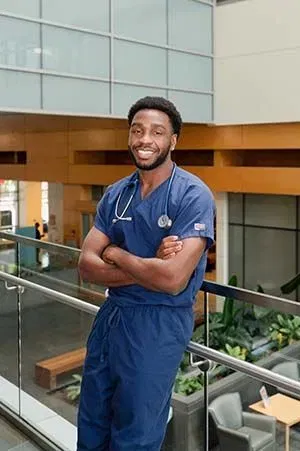Uriah Chapman’s journey to becoming a medical doctor is nothing short of inspiring. Overcoming a turbulent childhood marked by personal loss and financial struggles, Chapman recently graduated from the Medical University of South Carolina (MUSC) in an accelerated three-year program — the only student in his class to do so. His story is a powerful reminder of resilience, determination, and the impact of community support.
Early Life Challenges
Chapman’s life took a difficult turn early on. At just 16 years old, he lost his mother to a drug overdose. Shortly afterward, his stepfather remarried and moved away, leaving Chapman to face the world largely on his own during his most vulnerable years. This period was marked by instability and hardship, yet Chapman refused to let these setbacks define his future.
Despite the obstacles, he found comfort in his faith, which became a cornerstone in his transformation. It was this newfound strength that helped him regain focus in school and rebuild his academic path.
A Nontraditional Path to Medicine
Unlike many of his peers, Chapman did not follow a straightforward path to medical school. After high school, he attended the University of South Carolina, where he impressively earned a triple major in Biology, Public Health, and Sociology. This diverse academic background laid a strong foundation for his medical career.
Before entering medical school, Chapman worked as an emergency medical technician (EMT), gaining practical experience and a deeper understanding of healthcare from the front lines. His work as an EMT also fueled his passion to pursue medicine, knowing firsthand the impact healthcare professionals can make.
When Chapman applied to MUSC, he was initially accepted into the traditional four-year medical program. However, his exceptional academic performance and commitment led to an opportunity to enroll in an accelerated three-year track. This rare accomplishment allowed him to graduate early, setting him apart as a dedicated and driven student.
Overcoming Financial Hardships
Financial struggles were another hurdle Chapman had to overcome. Throughout medical school, he balanced multiple jobs to support himself, showing tremendous perseverance and work ethic. His efforts did not go unnoticed. MUSC awarded him a full-tuition scholarship, alleviating much of his financial burden.
Additionally, Chapman was a recipient of the Bell Family Scholarship Endowment, which is designed to support Black students pursuing health careers at MUSC. This scholarship not only provided financial assistance but also represented the importance of investing in diverse future healthcare leaders.
Looking Ahead: Residency and Future Goals
Now, as Chapman prepares to begin his residency in internal medicine at MUSC, he reflects on the journey with gratitude and hope. He believes that the struggles he faced have given him a unique perspective, enabling him to approach medicine with empathy and understanding.
“I’ve learned that God doesn’t waste anything. All things come together in due time,” Chapman said, emphasizing the value of patience and faith in overcoming adversity.
His journey serves as an inspiration for many who face similar challenges, proving that with perseverance, community support, and determination, it is possible to rise above hardship.
Importance of Support Programs and Scholarships
Chapman’s success story highlights the critical role of scholarships and support programs for students from underrepresented backgrounds. According to the U.S. Department of Education, scholarships and financial aid can significantly impact college completion rates and access to professional careers, particularly for minorities and students from low-income families (studentaid.gov).
Similarly, programs that provide mentorship and financial backing, like MUSC’s Bell Family Scholarship Endowment, are essential in fostering diversity and inclusion within the medical field. The Health Resources and Services Administration (HRSA) under the U.S. Department of Health and Human Services also emphasizes the importance of supporting minority health professions to reduce healthcare disparities across the country (hrsa.gov).


